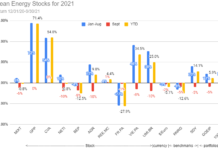Garvin Jabusch
At Green Alpha, we believe in investing in the scientifically objective world, and not an ideologically skewed version of it, so I’m often amazed at the attitudes and behavior of many of our colleagues in the financial services industry. For a group that’s supposed to be practicing objectively quantified decision making, finance-types can be remarkably motivated by ideology. Especially where a particular ideology is being promoted by the largest and richest industry in the history of civilization, fossil-fuels, whose representatives will stop at nothing to convince us that their product is safe, causes no warming, and will last forever. If there’s a reference case for finance-industry climate denial, it has to be the Wall Street Journal’s piece last January wherein editors not only denied climate science but purported to be the purveyors of scientific truth (i.e., there’s no warming). The Union of Concerned Scientists dismissed the Journal’s claims outright, as did many responsible climate scientists. But, no matter, since it’s in the Journal, finance’s paper of record, many of our colleagues in investment management blithely believed the disinformation and continue to invest accordingly. But this is both dangerous and questionable from a fiduciary point of view. Because, yes, truly, CO2 causes warming, and potentially extreme warming. And, yes, in addition, we truly are running up against existentially threatening resource constraints.
MIT researcher Graham Turner, in “perhaps the most groundbreaking academic work of the 1970s (Smithsonian),” The Limits to Growth, famously predicted that humanity’s outpacing of global resources may catch up to us in the form of civilization-level collapse as early as 2030. And it looks like his models may be right on track. However, as Smithsonian pointed out, Turner also noted that “unlimited economic growth was possible, if governments forged policies and invested in technologies to regulate the expansion of humanity’s ecological footprint.” In our terms, the translation is that the investment industry has got to stop placing bets on the legacy-economy technologies that got us into this situation, and start investing in next economy technologies, companies and solutions. It’s simple, we have to align humanities economic interests with earth’s various capacities. In the end, they represent the same goal.
Financial services has no business helping the fossil fuel oligarchs and their political lackeys bury the light of objective scientific reality. If this was all just about normal, thin veneer political posturing, we wouldn’t care at all. But it’s about so much more than that; it’s fundamentally about whether we destroy or maintain the fundamental underpinnings of world economies and of civilization itself. And investing in the world – the world as it is, not the world we ideologically wish existed – is inestimably important for long term portfolio returns, and also, crucially, for mitigating the chances of a failing global civilization.
Believe it or not, the primary risk we at Green Alpha assign to U.S. based next economy companies is home nation political risk. Political risk…of public companies…in a free market economy. Oxymoronic. Sounds more like a corrupt authoritarian regime type problem, right? Unfortunately, we’re not that far from that in the U.S. with respect to renewables and the next economy overall. Because, in general, U.S. policy makers (on the basis of payments, often to super-PACs), prefer to defend legacy fossil fuels at the expense of renewables. As Bill McKibben recently noted, “It’s as if the politicians are sort of pillows in front of the fossil fuel industry…And you spend all your time going after them and don’t get at the guys behind them.” And, all rhetoric to the contrary, most politicians don’t mind using taxpayer money to pick winners over losers, as observed this month via a decision by “United States Senators [who] voted to kill 37,000 American jobs [in wind energy], while giving $24 billion in tax breaks to big oil companies (story from Climate Progress).” It’s a vicious circle: congress people give fossil-fuels companies tens of billions of taxpayer money, the companies put part of that back into congress’ super PACs, and repeat.
I’ve said before that I don’t believe there is any power in Washington that can trump the money and leverage imposed on our system by the entrenched interests of fossil fuels and of Wall Street. And these fossil fuel and Wall Street oligarchs of course don’t only protect their interests via buying policymakers, but also, of course by spreading disinformation to the public from outlets from the Journal to the U.S. chamber of commerce. They do all this not caring that a temperature rise of 2° C, probably inevitable already, will make more likely everything from perilous food supplies to extreme weather. And at 3° on up, civilization begins to be at risk. They spread disinformation not caring that unlimited, almost free energy provided by our best renewables operating at scale will remove the billions of dollars a day drag on our economies, and emancipate us to resume real economic growth and prosperity.
Maybe if I was a fossil fuel billionaire I would feel differently. Maybe then the source of my wealth would make me willing to deliberately, cynically sacrifice the greater economy now and maybe civilization in the future. But as it is I can’t afford to do that. And, even though I work in the investment management industry, I won’t fall in line to help our oligarchs disseminate lies. Because in the harsh light of day, in the reality of the world as it is, their short sighted defense of the sources of their wealth, vicious as that defense is, may ruin us all.
For us, for me, it’s important that our portfolio constituents reflect the needs of the world – economically and ecologically (to the extent that there’s a difference any more) – as it is objectively defined by our best science. It’s important that our portfolios reflect the immutable laws of physics and ther
modynamics, as opposed to the ephemeral laws of human policymakers. Practical, unavoidable thermodynamic laws and physical constraints are what they are, will cause what they cause, and will wreak what havoc they will, no matter what propaganda is unleashed on us by the well funded machine of climate denialism. As popular awareness of earth’s realities advances, more and more capital will flow to companies, ideas and approaches that help solve our most pressing problems, and next economy portfolios will benefit proportionally. Venture capitalist Vinod Khosla, for example, believes that the next economy will spawn not only the ‘next Google,’ but, in fact, tens of Google-sized firms. We have few doubts Khosla’s right, save that perhaps as a civilization we’ll be so seduced by short term money and corruption that we’ll chase those things off a cliff. If we allow ourselves to brought to heel, to comply with the wishes of the legacy economy bosses, we could suffer the same fate as previous short-sighted societies like the Maya, like Easter Islanders.
But I don’t think we will. We live in an amazing age of limitless, almost free information (even if some fail to avail themselves of that). And as Ben Franklin said, “A nation of well informed men who have been taught to know and prize the rights which God has given them cannot be enslaved. It is in the region of ignorance that tyranny begins.” I don’t know about God, but I believe that where people have access to real, objective information about the reality of their world, they will ultimately make the sane and rational decisions required preserve that world. Disinformation, however well funded, won’t prevail forever. America may not believe in climate change, but it is upon us whether we acknowledge it or not. No matter what you believe in, we all as a civilization are and will be dealing with the consequences of a warming, resource constrained planet, starting, well, now. The sooner we invest in solutions, the better.
Garvin Jabusch is cofounder and chief investment officer of Green Alpha ® Advisors, and is co-manager of the Green Alpha ® Next Economy Index, or GANEX and the Sierra Club Green Alpha Portfolio. He also authors the blog “Green Alpha’s Next Economy.”








